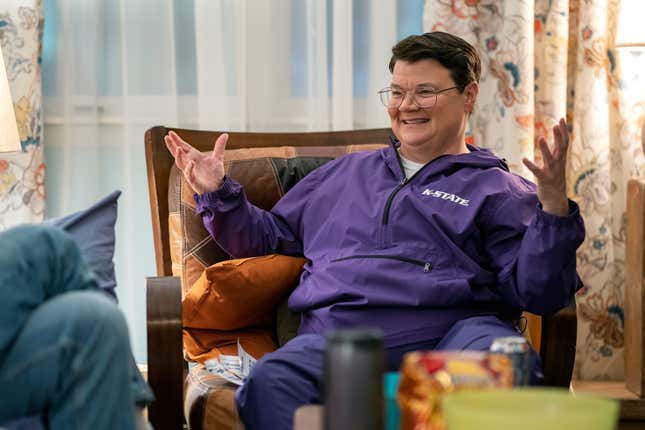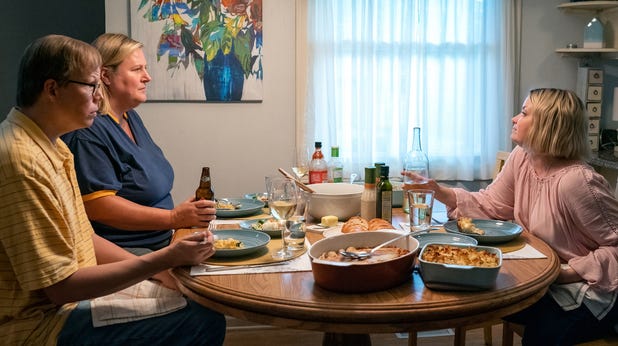Der bescheidene (und damit entwaffnende) Charme von HBO Jemand irgendwo ist direkt in seinen Titel gebacken. Hier wird Universalität durch Spezifität gefunden: Sam (der Brillante Bridget Everett) könnte jemand sein, irgendwo – New York City, sagen wir, wo ihre Gesangstalente gefeiert würden. Aber wenn die erste Staffel dieser von Hannah Bos und Paul Thureen geschaffenen Serie für irgendetwas stand, dann für die Überzeugung, dass manchmal der bloße Akt, irgendwo jemand zu sein (eine Schwester in Manhattan, Kansas, sagen wir), genug ist und sein sollte. Sams verkürzte Reise, um ihre Leute in ihrer kleinen Heimatstadt zu finden, ist absichtlich zurückhaltend. Ihr Kummer und ihre Frustrationen haben etwas Banales und Universales – aber auch ihre Freuden und Gaben.
Wenn es in Staffel eins darum ging, dass Sam Teile von sich selbst in Manhattan findet, beginnt Staffel zwei damit, uns zu zeigen, was sie gewonnen hat. Und die Szene ist genauso bescheiden und so urkomisch und zärtlich wie jeder der besten Momente der ersten Staffel: Als Sam und Joel (Jeff Hiller) ins Spiel kommen, werden wir Zeuge, wie nahe sie sich gekommen sind und wie sich ihre Kurzschrift entwickelt hat . Aber selbst in dieser Nähe Jemand irgendwo beginnt zu enthüllen, wie weit Sam noch gehen muss. Es mag ein Moment sein, in dem Sie es verpassen werden, aber ihr Engagement für NNP („keine neuen Leute“) sollte uns innehalten – ebenso wie Joel, dessen gesellige Offenheit so viel für Sams soziales Leben getan hat . Aber es dauert noch eine Weile. (Nebenbemerkung: Ich liebe die Art und Weise, wie sie beide ihre Zuneigung zueinander in eine urkomische Pointe verwandelt haben. Solch ein Moment zeigt, wie flink Jemand irgendwo spreizt die Grenze zwischen Sams Zynismus und Joels Aufrichtigkeit.)
Wie wir erfahren, wurde Sam damit beauftragt, sich um die Farm ihres Vaters zu kümmern, und so bleibt ihr Wunsch, ihren sozialen Kreis einzuschränken, ein defensiver Schritt. Sie kämpft damit, mit ihrer Schwester Tricia (Mary Catherine Garrison) gut auszukommen, die es selbst durchmacht. Schließlich endete die letzte Saison damit, dass sie herausfand, dass ihr Mann sie mit ihrer BFF/Geschäftspartnerin betrogen hatte. Das ist eine Menge zu verarbeiten; Fügen Sie hinzu, dass ihre Tochter jetzt aufs College geht (nicht weniger mit einem „DREAM“ -Schild im Schlepptau!) Und Sie fühlen irgendwie mit Tricia und ihrer ständig verärgerten Stimmung. Dass sie in ihr eigenes Drama verwickelt ist, bedeutet jedoch, dass Tricia Sam allein lässt, um sich um die Vorbereitung der Familienfarm für den Verkauf zu kümmern, was ihr Vater jetzt will, da er sich auf den Weg macht, sich um ihre Krankheit zu kümmern (und anscheinend , jetzt Kettenraucherin!) Mutter.
Tricia and Sam are, each in their own way, trying to move on. Or being forced to do so. And at a broader level with their storylines, Somebody Somewhere seems to be asking a crucial questions many of us have grappled with at some point in our lives: How do we move on without losing what we had? How do we move forward without leaving behind that which makes us who we are? Namely: How do we grow?
Watching Sam clean out the barn (and silently break down with Joel on the phone) is heartbreaking precisely because it captures how hard it is to do the painful work of shedding the old to usher in the new. Good then that the show, rather than merely wallow in such thorny and melancholy feelings, whisks us eventually to a “lit” night in between Joel, Sam, and Tricia(!) which turns out to be a lot more fun than any of them would have anticipated. Thank the pencil test!

Such a blend, between quiet moments of introspection and riotiously funny scenes (Joel and Sam laughing hysterically after a shaker mishap, for instance, is a moment I have to imagine wasn’t scripted) is a hallmark of why Somebody Somewhere is such a welcome gem in today’s television landscape. To break down even in its plot in a recap like this one reveals just how attentive the show is about the moments in between—in between life changing decisions, in between family crises, in between the points in our lived experiences that otherwise make up the bulk of television shows. Instead, Somebody Somewhere values mundane visits, late-night chats and, yes, even walks to get one’s steps in. Because it understands that’s where the bulk of life happens.
Stray observations
- Going into season two, we knew Somebody Somewhere would have to address the loss of Mike Hagerty, who played Sam’s father. The actor passed away in May last year. Given the way season one was structured around the grief surrounding Sam’s sister and the desire, perhaps, to buoy its sophomore entry into brighter, sunnier territory, it makes sense Ed would become an unseen character who remains alive just… elsewhere, communicating via letters and proxies. I will say this, though, we’ll surely miss his presence this season; so much of the familial tenderness came from Ed that I am curious how his absence (if not his death) will ripple through Sam and Tricia’s lives. Especially as they’re forced to now deal with their mother on their own.
- “Pound It Or Pass It” is my new favorite game/the alternate name for a game I already like to play which is basically to go “Yes!” (sometimes to myself, often to those beside me) whenever I pass a guy I would like to pound while I’m out and about.
- I have to single out that real-estate sign that made Tricia’s blood boil because it is so incoherent and hilarious I had to go back and reread it to make sure I wasn’t somehow scrambling words in my own brain: “Thanks ‘Manhappiness’ for putting your Faith and Hope in Charity.”
- Tricia (Mary Catherine Garrison) skirts the line of being a cartoonish suburban Live Laugh Love kinda gal but hearing her utter a line like “I don’t want to be a divorced person” was heartbreaking in its simplicity—a reminder that what Somebody Somewhere does best is to highlight the humanity of its characters, no matter how absurd or cliché or stereotypical they may at first appear.
- “It’s like an Ewok’s on your lap” will have me laughing in stitches for weeks to come, I can assure you.


